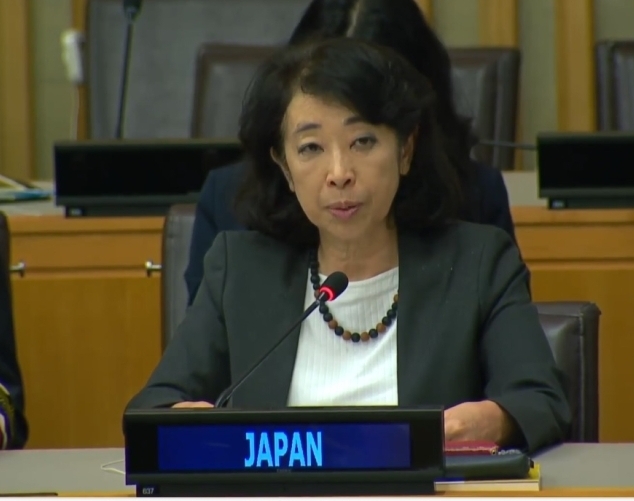Statement by H.E. Ambassador SHINO Mitsuko, Deputy Permanent Representative of Japan to the United Nations, at the Peacebuilding Commission Ministerial-level meeting
2023/9/22

Thank you, Mr. Chair. I also thank the briefers for their insightful inputs.
Mr. Chair,
The PBC has been leading the discussion on peacebuilding since its establishment in 2005. Japan, as the original member of the organizational committee, has continuously advocated the importance on strengthening the role of individuals in peacebuilding through institution building and capacity building. This fosters national ownership, which is the key for sustainable peace in the post-conflict situation.
Today, peacebuilding comes to have various aspects. Simply addressing conflicts themselves is not enough. Preventing conflict as well as sustaining the peace after conflict becomes more vital for peacebuilding.
We are witnessing dramatic changes in global geopolitics and profound challenges to the international order. We need to address the emerging risk multipliers such as climate change, infectious diseases, food and energy insecurity, and the implications of rapidly developing technology including AI.
I believe the United Nations is the most pivotal platform that can promote an integrated approach to tackle these complex and intertwined issues in peacebuilding. I therefore highly appreciate the Chair’s initiative to hold this ministerial-level PBC meeting.
Mr. Chair,
Peacebuilding requires our continuous efforts. Such efforts must address the concerns of the vulnerable. In this vein, I want to highlight the following two perspectives.
First, the process of peacebuilding holds profound significance. To achieve a resilient peace, it is necessary to build a system in which a wide range of actors, especially women and youth, are actively involved and can be agents of change in their own society. Thus, institution building and capacity building are key. Especially, we cannot stress enough the importance of education. Japan has been working to realize human security by “investing in people”.
Second, conflict prevention should receive greater emphasis. The PBC should strengthen its role in conflict prevention through information sharing and early warnings before a conflict arises.
Mr. Chair,
In order to enhance our efforts in peacebuilding, the PBC can and should play a greater role as a platform for peacebuilding discussions. Japan expects the PBC to fully utilize its advisory, bridging and convening role, and strengthen its cooperation with UN bodies such as the Security Council and the General Assembly, international financial institutions, and other actors.
Japan’s longstanding commitment to peacebuilding is clear through our initiatives such as hosting the Security Council Open Debate on peacebuilding and making contributions to the Peacebuilding Fund. Japan remains committed to peacebuilding as our top priority.
Mr. Chair,
Japan welcomes the launch of the "New Agenda for Peace" in light of the new global environment and challenges. I echo the view of Secretary-General Guterres in this report, where he stressed that our political decisions and actions “can either sustain or crush hopes for peace.”
Let me conclude by reiterating Japan’s resolve to promoting peacebuilding looking ahead to the 2024 Summit of the Future and beyond.
